Wenzheng Zhang
ReNCE: Learning to Reason by Noise Contrastive Estimation
Jan 30, 2026Abstract:GRPO is a standard approach to endowing pretrained LLMs with reasoning capabilities. It estimates the advantage of an outcome from a group of $K$ outcomes, and promotes those with positive advantages inside a trust region. Since GRPO discriminates between good and bad outcomes softly, it benefits from additional refinements such as asymmetric clipping and zero-variance data filtering. While effective, these refinements require significant empirical insight and can be challenging to identify. We instead propose an explicit contrastive learning approach. Instead of estimating advantages, we bifurcate $K$ outcomes into positive and negative sets, then maximize the likelihood of positive outcomes. Our approach can be viewed as an online instantiation of (multi-label) noise contrastive estimation for LLM reasoning. We validate our method by demonstrating competitive performance on a suite of challenging math benchmarks against strong baselines such as DAPO and online DPO.
Loop Closure using AnyLoc Visual Place Recognition in DPV-SLAM
Jan 06, 2026Abstract:Loop closure is crucial for maintaining the accuracy and consistency of visual SLAM. We propose a method to improve loop closure performance in DPV-SLAM. Our approach integrates AnyLoc, a learning-based visual place recognition technique, as a replacement for the classical Bag of Visual Words (BoVW) loop detection method. In contrast to BoVW, which relies on handcrafted features, AnyLoc utilizes deep feature representations, enabling more robust image retrieval across diverse viewpoints and lighting conditions. Furthermore, we propose an adaptive mechanism that dynamically adjusts similarity threshold based on environmental conditions, removing the need for manual tuning. Experiments on both indoor and outdoor datasets demonstrate that our method significantly outperforms the original DPV-SLAM in terms of loop closure accuracy and robustness. The proposed method offers a practical and scalable solution for enhancing loop closure performance in modern SLAM systems.
Topological Mapping and Navigation using a Monocular Camera based on AnyLoc
Jan 03, 2026Abstract:This paper proposes a method for topological mapping and navigation using a monocular camera. Based on AnyLoc, keyframes are converted into descriptors to construct topological relationships, enabling loop detection and map building. Unlike metric maps, topological maps simplify path planning and navigation by representing environments with key nodes instead of precise coordinates. Actions for visual navigation are determined by comparing segmented images with the image associated with target nodes. The system relies solely on a monocular camera, ensuring fast map building and navigation using key nodes. Experiments show effective loop detection and navigation in real and simulation environments without pre-training. Compared to a ResNet-based method, this approach improves success rates by 60.2% on average while reducing time and space costs, offering a lightweight solution for robot and human navigation in various scenarios.
* Published in Proc. IEEE CASE 2025. 7 pages, 11 figures
MinerU2.5: A Decoupled Vision-Language Model for Efficient High-Resolution Document Parsing
Sep 26, 2025Abstract:We introduce MinerU2.5, a 1.2B-parameter document parsing vision-language model that achieves state-of-the-art recognition accuracy while maintaining exceptional computational efficiency. Our approach employs a coarse-to-fine, two-stage parsing strategy that decouples global layout analysis from local content recognition. In the first stage, the model performs efficient layout analysis on downsampled images to identify structural elements, circumventing the computational overhead of processing high-resolution inputs. In the second stage, guided by the global layout, it performs targeted content recognition on native-resolution crops extracted from the original image, preserving fine-grained details in dense text, complex formulas, and tables. To support this strategy, we developed a comprehensive data engine that generates diverse, large-scale training corpora for both pretraining and fine-tuning. Ultimately, MinerU2.5 demonstrates strong document parsing ability, achieving state-of-the-art performance on multiple benchmarks, surpassing both general-purpose and domain-specific models across various recognition tasks, while maintaining significantly lower computational overhead.
Deformable Cluster Manipulation via Whole-Arm Policy Learning
Jul 22, 2025Abstract:Manipulating clusters of deformable objects presents a substantial challenge with widespread applicability, but requires contact-rich whole-arm interactions. A potential solution must address the limited capacity for realistic model synthesis, high uncertainty in perception, and the lack of efficient spatial abstractions, among others. We propose a novel framework for learning model-free policies integrating two modalities: 3D point clouds and proprioceptive touch indicators, emphasising manipulation with full body contact awareness, going beyond traditional end-effector modes. Our reinforcement learning framework leverages a distributional state representation, aided by kernel mean embeddings, to achieve improved training efficiency and real-time inference. Furthermore, we propose a novel context-agnostic occlusion heuristic to clear deformables from a target region for exposure tasks. We deploy the framework in a power line clearance scenario and observe that the agent generates creative strategies leveraging multiple arm links for de-occlusion. Finally, we perform zero-shot sim-to-real policy transfer, allowing the arm to clear real branches with unknown occlusion patterns, unseen topology, and uncertain dynamics.
Grasping by parallel shape matching
Dec 11, 2024



Abstract:Grasping is essential in robotic manipulation, yet challenging due to object and gripper diversity and real-world complexities. Traditional analytic approaches often have long optimization times, while data-driven methods struggle with unseen objects. This paper formulates the problem as a rigid shape matching between gripper and object, which optimizes with Annealed Stein Iterative Closest Point (AS-ICP) and leverages GPU-based parallelization. By incorporating the gripper's tool center point and the object's center of mass into the cost function and using a signed distance field of the gripper for collision checking, our method achieves robust grasps with low computational time. Experiments with the Kinova KG3 gripper show an 87.3% success rate and 0.926 s computation time across various objects and settings, highlighting its potential for real-world applications.
Seq2seq is All You Need for Coreference Resolution
Oct 20, 2023Abstract:Existing works on coreference resolution suggest that task-specific models are necessary to achieve state-of-the-art performance. In this work, we present compelling evidence that such models are not necessary. We finetune a pretrained seq2seq transformer to map an input document to a tagged sequence encoding the coreference annotation. Despite the extreme simplicity, our model outperforms or closely matches the best coreference systems in the literature on an array of datasets. We also propose an especially simple seq2seq approach that generates only tagged spans rather than the spans interleaved with the original text. Our analysis shows that the model size, the amount of supervision, and the choice of sequence representations are key factors in performance.
Improving Multitask Retrieval by Promoting Task Specialization
Jul 01, 2023Abstract:In multitask retrieval, a single retriever is trained to retrieve relevant contexts for multiple tasks. Despite its practical appeal, naive multitask retrieval lags behind task-specific retrieval in which a separate retriever is trained for each task. We show that it is possible to train a multitask retriever that outperforms task-specific retrievers by promoting task specialization. The main ingredients are: (1) a better choice of pretrained model (one that is explicitly optimized for multitasking) along with compatible prompting, and (2) a novel adaptive learning method that encourages each parameter to specialize in a particular task. The resulting multitask retriever is highly performant on the KILT benchmark. Upon analysis, we find that the model indeed learns parameters that are more task-specialized compared to naive multitasking without prompting or adaptive learning.
EntQA: Entity Linking as Question Answering
Oct 05, 2021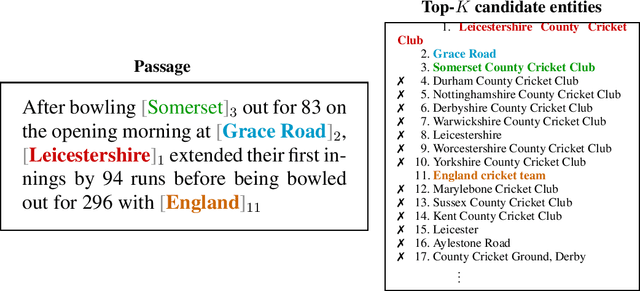
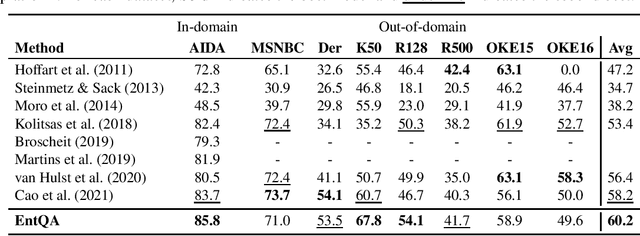


Abstract:A conventional approach to entity linking is to first find mentions in a given document and then infer their underlying entities in the knowledge base. A well-known limitation of this approach is that it requires finding mentions without knowing their entities, which is unnatural and difficult. We present a new model that does not suffer from this limitation called EntQA, which stands for Entity linking as Question Answering. EntQA first proposes candidate entities with a fast retrieval module, and then scrutinizes the document to find mentions of each candidate with a powerful reader module. Our approach combines progress in entity linking with that in open-domain question answering and capitalizes on pretrained models for dense entity retrieval and reading comprehension. Unlike in previous works, we do not rely on a mention-candidates dictionary or large-scale weak supervision. EntQA achieves strong results on the GERBIL benchmarking platform.
Understanding Hard Negatives in Noise Contrastive Estimation
Apr 13, 2021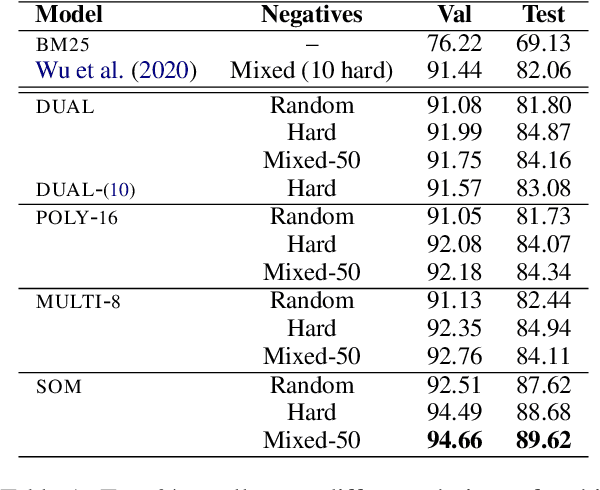
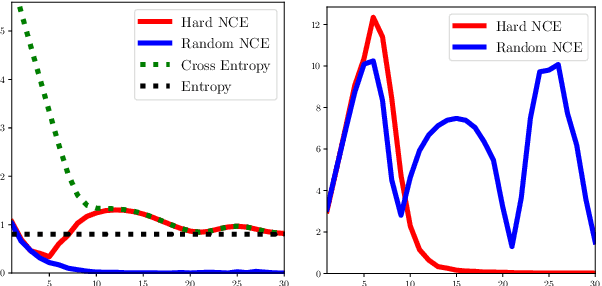
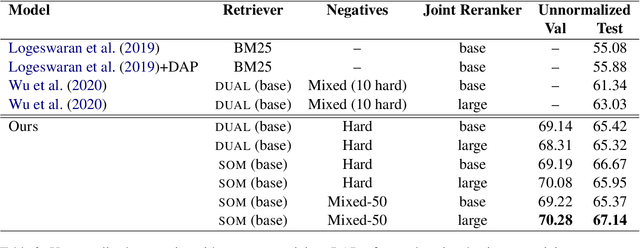

Abstract:The choice of negative examples is important in noise contrastive estimation. Recent works find that hard negatives -- highest-scoring incorrect examples under the model -- are effective in practice, but they are used without a formal justification. We develop analytical tools to understand the role of hard negatives. Specifically, we view the contrastive loss as a biased estimator of the gradient of the cross-entropy loss, and show both theoretically and empirically that setting the negative distribution to be the model distribution results in bias reduction. We also derive a general form of the score function that unifies various architectures used in text retrieval. By combining hard negatives with appropriate score functions, we obtain strong results on the challenging task of zero-shot entity linking.
 Add to Chrome
Add to Chrome Add to Firefox
Add to Firefox Add to Edge
Add to Edge